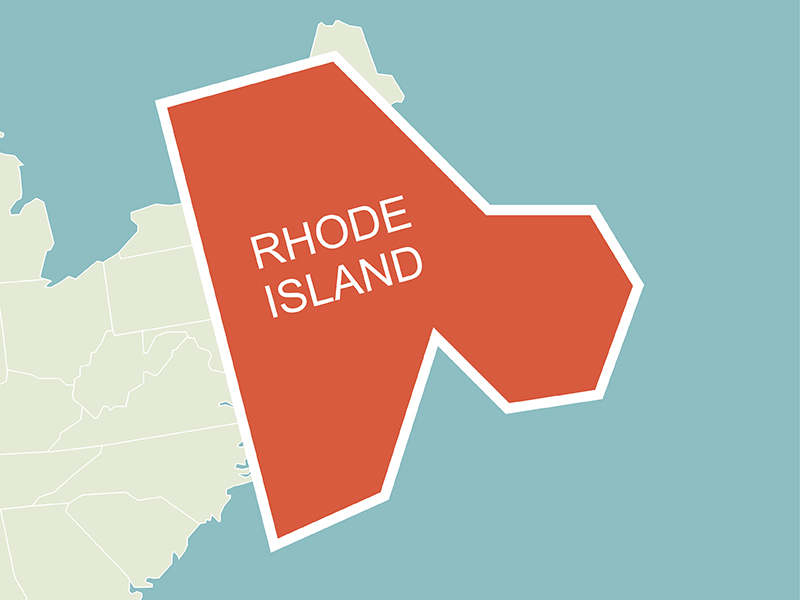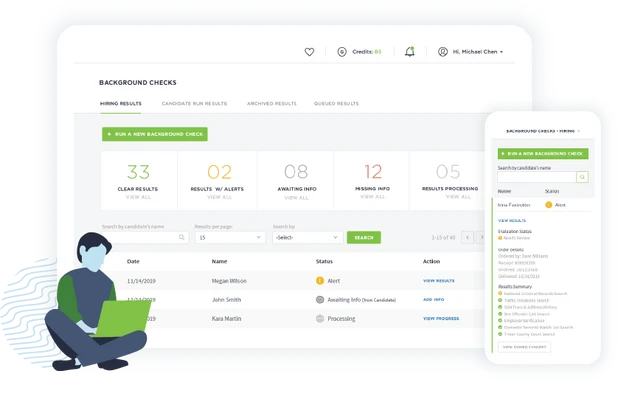
Table of Contents
Rhode Island background screenings serve as valuable tools for employers aiming to gain deeper insights into the criminal records, driving histories, and prior employment of job applicants or potential volunteers. Adhering to federal, state, and local regulations governing the process is imperative for employers, dictating the appropriate methods and timing for conducting these checks. Here’s an overview of key considerations regarding Rhode Island background screenings.
In Rhode Island, background checks encompass thorough searches of public records, databases, and various sources to gather details regarding a candidate’s past, professional credentials, and suitability for a job or volunteer role. Employers have the discretion to tailor background checks according to their specific policies.
Rhode Island mandates criminal history screenings for several roles, such as nurses, childcare workers, church volunteers, foster care parents, and private security personnel. Below is a concise table outlining some positions in Rhode Island that necessitate pre-employment background checks:
| Job Category | To Whom It Applies | Required Background Check(s) |
|---|---|---|
| Childcare workers | All job applicants seeking employment with childcare providers licensed by the Rhode Island Department of Human Services | Pre-employment background checks including national Federal Bureau of Investigation (FBI) criminal history check; Bureau of Criminal Investigations (BCI) Rhode Island criminal background check; Rhode Island Child Abuse and Neglect Registry (from the Department of Children, Youth, and Families); interstate child abuse and neglect registry; state and national sex offender registries |
| Caregivers | Caregivers at nursing facilities, home nursing-care agencies, hospice, or home care providers who have direct contact with patients and residents, and may work without other employees present | National criminal records check that includes fingerprints submitted to the FBI, to be conducted prior to employment or within one week of beginning work |
| State positions with access to federal tax returns | Applicants to positions with state agencies that involve working with federal tax return information | National and state criminal background checks conducted prior to employment and at least every ten years thereafter |
| Firefighters | Any person seeking employment as a firefighter with any city or town in Rhode Island | National and state criminal background checks conducted prior to or within one week of employment |
| School employees and volunteers | All applicants seeking employment at a public or private school School volunteers who may have direct and unmonitored contact with children or students | Job applicants are required to undergo national and state criminal background checks School volunteers must submit to state criminal background checks |
Rhode Island Background Check Laws
Rhode Island background check laws can impact how and when employers conduct pre-employment background screening, and what information they may consider during a background check. Rhode Island has a statewide ban-the-box law that applies to both public and private sector employees. Additional state laws include provisions relating to expunged criminal records, social media accounts, wage history, and credit reports.
In addition to state laws, the federal Fair Credit Reporting Act (FCRA) applies to background checks conducted by consumer reporting agencies (CRAs), like Rapid Hire Solutions. To avoid legal liability, employers may want to comply with the strictest laws and regulations.
BAN-THE-BOX
This state law prohibits both public and private employers (with more than four employees) in Rhode Island from asking whether a candidate has ever been arrested, charged with, or convicted of a crime on a job application. The law makes an exception for positions in law enforcement or where a past conviction would be disqualifying: for example, jobs that require a fidelity bond. Employers may inquire about a candidate’s past criminal convictions during a first interview. However, employers may not ask about arrests that did not result in conviction at any point.
EXPUNGED RECORDS
Under R.I. Gen L § 12-1.3-4, candidates who have had criminal records legally expunged in Rhode Island can state to a prospective employer that they have not been convicted of an offense, unless this information is required as part of an application for a position in law enforcement, childcare, teaching, or coaching. With similar exceptions, custodians of these records may not disclose expunged information. Agencies reporting criminal history information should not report expunged records.
SOCIAL MEDIA ACCESS
Under R.I. Gen L § 28-56-2, employers may not require, coerce, or request a job applicant to disclose their social media passwords or other access information. Employers are also prohibited from asking a candidate to access social media accounts in their presence.
WAGE HISTORY
Using a person’s past wages to set their wages on a new job can help to perpetuate wage inequality. To encourage pay equity, R.I. Gen. Laws § 28-6-22 prohibits employers from inquiring about a candidate’s prior wage history or using it as a determining factor when deciding whether to hire or what to pay.
CREDIT REPORTS
Under R.I. Gen. Laws § 6-13.1-21, employers must inform candidates that a credit report may be requested in connection with their application. Employers must advise candidates of adverse action taken as a result of information in a credit report, and should disclose the name and address of the credit bureau making the report.
FAIR CREDIT REPORTING ACT (FCRA)
Employers that partner with a CRA to conduct background checks must follow the guidelines outlined in the FCRA. To comply with this federal law, you must provide candidates with written notice of your intent to conduct a background check and obtain written consent from the candidate before proceeding. If you decide not to hire a candidate based on information contained in a background screening report, you must also follow the adverse action process.
What Shows Up On A Rhode Island Background Check?
The information revealed in a Rhode Island background check hinges on the chosen screening methods. The criteria for these screenings can vary based on an employer’s policies, the industry, and the specific job role. Here’s an overview of typical employment background checks and the insights they may provide:
- Criminal background checks can uncover felony and misdemeanor convictions, ongoing cases, and any adult incarceration history.
- Civil court searches divulge non-criminal court records, encompassing bankruptcies, liens, judgments, tax disputes, and breaches of federal regulations or civil liberties.
- Motor vehicle records (MVRs) furnish details on license status, traffic infractions, license suspensions, accident records, and driving-related convictions such as DUIs.
- Employment verification confirms a candidate’s prior employers, job titles, and periods of employment.
- Credit checks furnish data on debt-to-income ratios, past bankruptcies, individual credit and payment histories, and accounts in collections.
Regarding disqualifications on a Rhode Island background check, determinations are typically influenced by the nature of the role and the employer’s screening policies. While there’s usually no statutory definition of a failed background check for employment in Rhode Island, certain outcomes may warrant further evaluation, including:
- Specific criminal convictions might render a candidate ineligible, subject to the employer’s guidelines, the position’s nature, and the severity, timeliness, and relevance of the conviction. Some convictions could legally bar a candidate from certain roles; for instance, Rhode Island law prohibits licensed nursing care workers from having convictions for offenses like murder, patient abuse, or arson.
- A history of traffic violations, accidents, or DUIs could disqualify an applicant for driving-related positions, including those regulated by the US Department of Transportation.
- A positive drug test may lead to disqualification for safety-sensitive roles or within workplaces with drug-free policies. For instance, testing positive in a pre-employment drug screening could result in disqualification for a position in Rhode Island law enforcement.
How Long Does A RI Background Check Take?
The timeframe for completing a background check in Rhode Island varies depending on the type of search and who is conducting it. Employers opting to handle background checks internally may encounter significant delays while navigating public record systems and manually reviewing case details.
For instance, state criminal background checks and national background checks sent to the Rhode Island Attorney General’s office typically require seven days for processing. While members of the public, including employers, can search the Rhode Island Judiciary public access portal for record verification, obtaining full case records may necessitate in-person visits to the relevant courthouse. This process can be time-intensive for HR teams.
Tasks requiring manual verification, such as employment and education confirmations, also contribute to delays as team members contact previous employers and academic institutions and await responses.
Collaborating with a reputable CRA, such as Rapid Hire Solutions, can alleviate the time constraints faced by you and your team. Additionally, partnering with a CRA often leads to improved turnaround times. Rapid Hire Solutions boasts access to over 2,100 databases and more than a billion digitized records. Database searches, such as national criminal background screenings, frequently yield results within minutes.
How Far Back Does A Background Check Go In Rhode Island?
The timeframe covered by a Rhode Island background check is contingent upon the type of screening and the entity conducting the search. Federal, state, and local laws can also influence the scope of the search or the duration for which records remain accessible.
While some states impose limitations on the retrospective period for pre-employment background checks, Rhode Island does not have such restrictions. However, certain state laws in Rhode Island might impact the information reported. For instance, certain driving infractions in Rhode Island might be expunged after three or five years, potentially affecting the content of a candidate’s motor vehicle record.
Employers collaborating with a CRA for background checks are obligated to adhere to the federal FCRA, which imposes constraints on the reporting duration for non-conviction data, such as arrests, civil judgments, liens, and credit reports, limiting it to seven years. Bankruptcy records may be reported for up to 10 years, while criminal convictions have no expiration date for reporting. These regulations may not be applicable if the position offers a salary of $75,000 or more.
How To Get A Background Check in RI
Employers in Rhode Island have the option to conduct background checks internally or enlist the services of a reputable background check provider. While certain pre-employment screenings may be feasible for HR personnel to handle, many entail considerable effort to complete thoroughly.
For instance, employers can search Rhode Island court records via the online Rhode Island Judiciary public portal. Additionally, Rhode Island state criminal history reports are accessible through the Rhode Island Attorney General’s office, although these do not encompass out-of-state or federal records. To obtain these reports, employers must furnish a notarized release form signed by the candidate along with a photocopy of their photo ID. Requests for reports can be submitted via mail or in person.
The Office of the Attorney General also administers fingerprint-based national background checks conducted by the FBI. Candidates are required to visit the Attorney General’s office in person for fingerprinting and to initiate the report request process.
For employers requiring access to multiple records, establishing a subscription account with the DMV can facilitate the processing and payment of driving record checks. Alternatively, they may opt to collaborate directly with a background check provider.
Partnering with a reputable CRA like Rapid Hire Solutions streamlines the entire process. Rapid Hire Solutions offers customizable background check packages encompassing comprehensive criminal background checks, driving records, credit checks, employment verification, drug testing, and more. With fast turnaround times, precise results, and user-friendly workflows, this approach saves time and ensures compliance.
How Much Does A Background Check Cost In Rhode Island?
The expense associated with a Rhode Island background check can vary based on the specific searches required, the quantity of searches, and whether you opt to conduct the searches independently or collaborate with a qualified CRA, such as Rapid Hire Solutions.
Employers who opt for self-directed public record searches may encounter diverse fees and expenditures. For instance, a Rhode Island state criminal background check incurs a fee of $5 from the Rhode Island state police, while national fingerprint-based background checks carry a cost of $45. A DMV subscription enabling access to driver’s license history records demands an initial payment of $100, along with an additional $21 per record searched. Although accessing public court records is typically free (excluding per-page copy charges of up to 20 cents), obtaining complete case records in Rhode Island often necessitates visiting a courthouse during specified hours and utilizing a public computer terminal. When factoring in the cost of staff time, even seemingly “free” searches entail financial outlays.
Engaging a CRA like Rapid Hire Solutions often proves to be more cost-effective, considering the time savings for your hiring team and the availability of packages encompassing multiple screenings. Packages with Rapid Hire Solutions, now a Checkr company, commence at $29.99 and can be tailored to suit various hiring requirements.
County Resources
Rhode Island’s geographical divisions are delineated by its five counties, although these counties lack operational county governments. Instead, Rhode Island comprises 39 municipalities, each governed independently. Public information searches, including criminal history and civil court records, are typically conducted at either the state or municipal level. Here’s a breakdown of Rhode Island’s five counties, along with details on public records accessibility in each county and its most populous city:
BRISTOL COUNTY
Bristol County, with a population of 50,360 residents, stands as Rhode Island’s least populous county and ranks as the third smallest county in the United States. The town of Bristol boasts a rich maritime history and serves as a prominent deepwater seaport, historically renowned for its maritime industry and shipbuilding endeavors. Presently, the scenic and historically significant coastal towns within Bristol County often function as extended suburbs of the nearby city of Providence.
Public Information & Records:
KENT COUNTY
Situated at a central location, Kent County boasts a population of 171,275 residents. It borders the greater Providence area while also being conveniently located just an hour south of Boston. Warwick’s T.F. Green International Airport serves as a viable alternative for Boston-bound travelers and is seamlessly connected via Boston’s commuter train network.
Public Information & Records
- City of Warwick Website
- City of Warwick Public Records
- Kent County Arrest, Court, and Public Records
NEWPORT COUNTY
Though not the largest, Newport County is undeniably distinctive. Renowned for the Newport Jazz Festival, the city of Newport is also famous for its meticulously preserved Gilded Age mansions, once the summer residences of 19th-century industrial magnates. The county’s contemporary economy boasts a significant military and defense sector, with Navy Station Newport serving as a hub for educational, training, and research initiatives, including the Naval Underwater Warfare Center, a leading facility for undersea warfare research.
Public Information & Records
- City of Newport Website
- City of Newport Public Records
- Newport County Arrest, Court, and Public Records
PROVIDENCE COUNTY
As Rhode Island’s capital and most populous city, Providence is home to 189,563 of Providence County’s 657,288 residents. It hosts two prestigious educational institutions: Ivy League institution Brown University and the Rhode Island School of Design (RISD). Notable industries in Providence County include education, healthcare, and retail.
Public Information & Records
- City of Providence Website
- City of Providence Public Records
- Providence County Arrest, Court, and Public Records
A local ban-the-box law applies to public sector employees within the city government of Providence.
WASHINGTON COUNTY
With a population of 130,330 residents, Washington County ranks as the third most populous in the state. Its coastal towns attract numerous visitors from New York City and Boston who come to unwind and bask in the beauty of Block Island and Narragansett beaches. Tourism serves as a major economic driver in Washington County, complemented by thriving sectors in healthcare, education, and manufacturing.
Public Information & Records
Get A Rhode Island Background Check With Rapid Hire Solutions
Pre-employment background checks serve as a crucial tool for employers to ensure compliance with federal, state, and local hiring regulations, while also gaining insight into a candidate’s qualifications and background. However, navigating the complexities of conducting a thorough and compliant background check in Rhode Island can pose challenges for internal hiring teams.
By partnering with a reputable CRA such as Rapid Hire Solutions, the background screening process can be streamlined effectively. Rapid Hire Solutions provides 100+ screening options, coupled with swift turnaround times, automated tools, and customizable packages, all of which contribute to saving time and enhancing efficiency in your hiring procedures. Start conducting Rhode Island background checks today with Rapid Hire Solutions.
DISCLAIMER
The resources provided here are for educational purposes only and do not constitute legal advice. We advise you to consult your own counsel if you have legal questions related to your specific practices and compliance with applicable laws


